Lent

What do you want to pass on to your grandchildren? What will you give to future generations?
There’s a special spot on my shelf for books my grandparents handed down to me over the years. I cherish the collection of love poetry my grandfather gave my grandmother for a wedding anniversary decades ago. I treasure my grandfather’s old prayer book and hymnal. Depending on your family history, most of us will have at least a few old treasures from generations before.
Some things pass from one generation to another with special care—a family wedding ring, a chess set from the home country, old pictures. Other items, however, pass with less care and planning. My wife, for instance, has her grandmother’s old cookie jar. It’s made of cheap, simple glass and is completely unremarkable except for the memories of cookies eaten at grandma’s house it evokes.
Families aren’t the only ones thinking of passing things along. Politicians, skilled at tugging heartstrings, speak often of “future generations.”

Ash Wednesday begins Lent, a 40-day season in the church’s life leading up to the death and resurrection of Christ on Easter. It is traditionally meant to be a time of reflection, reevaluation, and renewal in our lives, both for the community of faith and in our relationship to the world. But the “R” word that is most characteristic of Lent is “repentance.” And repentance, biblically speaking, is not about the fire and brimstone television preachers but rather about the gospel call to turn around and go in a whole new direction.
Already in these first few days of Lent, I am reminded of how difficult confession, humility, and repentance are in our culture. Humility is something Americans are not particularly good at. Neither are we strong in the areas of self-examination, deep reflection, and repenting for things we have done wrong and then no longer doing them.
We tend to believe if people are poor, there really must be something more wrong with them than with those of us who are not. If black young men are having trouble with police, many white people suspect it must be the things that they are doing more than any problems with the systems we perpetuate.
Our family was just away for a week in the Dominican Republic on baseball service and mission trip, where our boys’ baseball teams do “spring training” with Dominican players and coaches. Spending a week in Consuelo with the Dominican players and the adults in their lives, and meeting the Grey Sisters of the Immaculate Conception who helped host us, provided a glimpse into their lives and a kind of poverty that most American young people have never seen.
We played on their rural “fields of dreams” cut out of sugar cane instead of corn, to wonderfully energetic community stadiums in what is truly a baseball culture. In one game, our high school team got to play the Detroit Tigers Dominican Academy teenage players. It was great baseball — but also a “life-changing experience,” as was told to me by many of our players and their coaches. In addition to the baseball skills, reflection, listening, learning, and asking big questions about how our lives affect others were the lessons of the week.
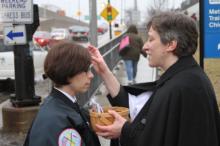
Lately, a particular quote has been wending its way around Facebook, popping up in the feeds of the most disparate names on my friends list. It appears written in feminine cursive script or blocky varsity letters or etched under a photo of leaping flames: “May the bridges I burn light the way.”
The words seem significant on Ash Wednesday, the first day of Lent, when ministers mark a believer’s forehead with a sign of the cross — two simple finger strokes drawn as a reminder of the impermanence of this world and our own mortality. The imposition of ashes is often accompanied by words from Genesis 3:19: Remember that you are dust, and to dust you shall return.
Lent is the season of reflection, reevaluation, reconciliation, and — here’s a hundred dollar Christian word — repentance. For many, the word “repent” calls to mind a red-faced TV preacher banging a hammy fist on the podium, or a guy in a sandwich board, standing on a corner yelling through a bullhorn about the fires of hell and the threat of damnation. YOU MUST REPENT!
But repent means, in the most literal sense, to turn in a different direction. It is less about avoiding being struck down by God than embarking on our own particular course-correction.
Lent is not about giving up stuff.
Lent is about the preparation of our hearts for what God has done in Christ.

The violence of our world seems to be spiraling out of control. Every news outlet is filled with the latest tragedy and for many, the violence has struck closer to home than they ever imagined. Sadly, much of the violence is being done in the name of religion. Religion — at its best — is designed to be a conduit for right relationship. At it’s worst, used as a tool for manipulation and violence. While the former is certainly happening, the latter appears to be one step ahead at the moment.
If ever there were a time where the work of peacemaking seemed soft and unrealistic while proposing some kind of fairy tale future reality, it is now. If ever there were a time to set aside the way of reconciliation for the way of revenge, it is now. Peacemaking appears to be a royal waste of time reserved for the ignorant idealists.
Yet, if ever there were a time the exact opposite case could be made, it is now. In recent history, there has never been a time peacemaking is more necessary. In fact, the moment we deny the necessity for peacemaking, we deny the very mission of God and the vocation of God’s people. God’s work is peace — the holistic repair of relationship — and the vocation of God’s people. We aren’t pawns in a divine drama that will end in an atomic holocaust allowing us to apathetically put our hands up in resignation because “everything is going to hell.” No, the Jesus Community is to announce the reality of God’s kingdom and participate in God’s activity of making all things new. And not just in some future world, but NOW.
Where do we start and how do we keep hope in a world of war?
We need to give up peace for Lent.

Chances are you’ll see a bunch of folks walking around with shmutz on their foreheads this Wednesday. The ‘Splainer asks what having a dirty forehead has to do with being a Christian and why this ritual is gaining in popularity.
Q: Excuse me, but why do you have dirt on your forehead?
A: Wednesday is Ash Wednesday, the day many Christians mark as the first day of Lent, the time of reflection and penitence leading up to Easter Sunday. Clergy all over the world dispense ashes, usually made by burning the palm fronds distributed on last year’s Palm Sunday, making the sign of the cross on the bowed foreheads before them. As they “impose” or “dispense” the ashes, the pastor or priest reminds each Christian of Genesis 3:19: “For dust you are and to dust you shall return.”
Q: Well, that’s cheerful. Why would anyone want to start a workday on such a downer?
A: It isn’t intended to be a downer. It’s supposed to be a reminder that our lives are short and we must live them to the fullest. OK, maybe it’s a little bit of a downer — that verse from Genesis is what God said to Adam and Eve when he expelled them from the Garden of Eden for their sins. But there’s a big party the night before Ash Wednesday. That’s Mardi Gras, or “Fat Tuesday,” a secular observance that evolved out of “Shrove Tuesday,” the last hurrah – usually marked by eating of pancakes or other sinfully sweet foods – before the solemnity and penance of Lent set in.
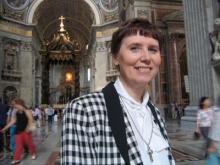
ROME — On its 15 previous pilgrimages, the Catholic gay rights group New Ways Ministry drew maybe two-dozen people to visit holy sites in places like Assisi and Rome.
This year, the number of pilgrims unexpectedly doubled to 50.
Chalk it up to the so-called Francis Effect, where the pope’s open-arms acceptance is giving new hope to gay and lesbian Catholics who have felt alienated from their church for decades.
What’s been even more surprising is that both New Ways and a similar Catholic LGBT organization in Britain are finding support from the Catholic hierarchy in their efforts to meet the pontiff when they both visit the Vatican on Ash Wednesday, the start of Lent, the period of penance and fasting preceding Easter.
For example, Archbishop Georg Ganswein, head of the papal household and the top aide to Pope Emeritus Benedict XVI, responded to New Ways’ request for a papal meet-and-greet by reserving tickets for the group at Francis’ weekly public audience in St. Peter’s Square. It’s not a private meeting — which is tough for anyone to get — but it’s not nothing.

ONE OF THE UNANTICIPATED effects of our health-care technologies is that we expect to live relatively pain-free lives, physically speaking. In the West, we do not imagine a physician saying to us “this will hurt” before cutting in. We expect to be anesthetized to avoid pain. In the same way we struggle with a biblical pathway to God, like Lent.
In Lent, we put ourselves on a lonely road with Jesus—40 days in the wilderness, struggling with hunger, thirst, loneliness, doubt, fear. In Lent, we put ourselves in a 40-year journey in the wilderness with the people Israel, wondering when, if ever, God will make good on the promises of a land flowing with milk and honey. In Lent, we do business with repentance.
Whatever else the church may say about repentance, we certainly say, “This will hurt. And not just a little.” Repentance means “turning around.” It also means dying, biblically speaking. We are drowned in baptism and raised to new life; we go to extremes in the wild until an entire generation dies off (the exodus) and until we are reduced to one searing set of emotions (the crucifixion). Jesus’ cross wasn’t light. Why should we expect ours to be?
Then there’s the good news. A resurrection is on the far side of that cross. Its blinding light pours around the edges of the stone rolled before the tomb. Resurrection is not in Lent, but it’s coming. In the meantime, in the words of John the Baptist, “Prepare the way.”

THE LAST SUNDAY IN FEBRUARY is the first Sunday of Lent. We are asked to prepare for Lent by searching our souls and repenting of our misdeeds in order to walk with Jesus on his road to the cross. After writing the final reflections below, I felt unfinished. Repentance is easy to talk about but exceedingly hard to do. We justify and excuse our actions when we’ve hurt a friend or made a bad choice. It’s usually someone else’s fault anyhow—they started it!
The most striking example of human resistance to repentance I’ve ever read was in C.S. Lewis’ little book The Great Divorce. The “divorce” is the huge gap between heaven and hell. Hell is not fiery but filled with people who can’t get along with each other and keep moving further apart in the darkness. Eventually, a few make their way to a bus stop where they get a ride to the outskirts of heaven. There everyone is met by someone from their past they’d rather not meet, and who begs them to repent, make restitution, or whatever is necessary to enjoy a joyful eternity of loving relationships. For almost all of them, it’s not worth it. They fear losing the bit of ego they have left. They’d rather go back to hell than repent and be reconciled with someone they love to hate.
No wonder repenting is the first step to entering the kingdom of God!
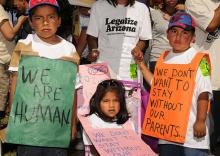
“That I may know him, and the power of his resurrection, and the fellowship of his sufferings, being made conformable unto his death; If by any means I might attain the resurrection of the dead.” Philippians 3:10-11
Harsh winters make us more deeply appreciative of spring. Last week, after a particularly intense winter, it finally reached 60 degrees in New York. I, for one, celebrated heartily. Spring is a reminder that winter is not interminable and flowers will bloom again. Almost exactly one year ago, the Senate released a bipartisan bill on immigration reform. Many Christian leaders celebrated the possibility that finally the nearly 11 million men, women, and children would be afforded the opportunity to integrate into this great country. In addition, in January the GOP released a set of principles that set the tone for the genuine possibility for immigration reform. There was a growing consensus that this is the year for immigration reform. Then the news started to change and many prognosticators said, “Immigration reform is dead.”
It is into this public eulogy of immigration reform that the Christian message of Lent and Easter can breathe new life.
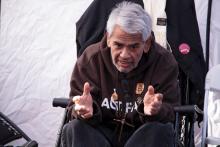
As an immigrant who made the long journey from Zacatecas, Mexico, to the farmlands of California many times as a child, the Lenten story of Jesus’s wandering for 40 days in the desert has always resonated with me very deeply. And the Easter celebration that follows sustains my hope and resolve that the faith community’s long movement to reform our broken immigration system will succeed.
Late last year, I, along with several other immigration advocates and inspiring faith leaders, camped out in a tent on the National Mall in Washington, D.C., to call attention to the moral crisis and human suffering caused by our broken immigration system. We asked ourselves: What are our faith, our words, and our history worth if not translated into action, sacrifice, and redemption?
So, for 30 days we fasted and prayed that leadership in the House of Representatives would follow the Senate’s lead and pass a comprehensive, bipartisan immigration reform bill. The power of prayer surrounded us as we were led in reflection on a daily basis by pastors who serve undocumented families, by immigrants who suffer under our unjust system, and by public officials who came to see our commitment as days without food turned into weeks.
Even though the House refused to act in 2013, we believe that our fast, and the support of thousands of solidarity fasters around the world, helped change the discussion about reform from one of dollars and cents to one about people and families. Our sacrifice and the suffering of our immigrant brothers and sisters will end in victory and redemption.

Oh my, did I need Opening Day this year. Opening Day, of course, is the first day of the baseball season. For baseball fans, it is a time when hope comes alive again, after a long winter of waiting.
On Opening Day, every team starts with a clean slate, all the win/loss records are 0-0 , and, as they say, “hope springs eternal.” There is talk in every baseball town and among all baseball fans of how we really could win this year if only this or that goes right, if our players could live up to their real potential, if we could finally “gel” as a team, and if all the things we can’t control could go well for us and not so well for the other teams. “Have you seen that new rookie?” And “that trade we just made could make all the difference now!” Everybody is a believer on opening day.
The Boston Red Sox need to throw off the long-lasting “curse” of the Bambino, which still lurks around Fenway Park despite their recent successes. The hated New York Yankees still stand in the way of another World Series ring. The Cubs fans in Chicago, with a record that would cause mere mortals to despair, have actually learned to nurse an almost eschatological hope of victory that might require the second coming of Christ to fulfill — but nonetheless, you hear chatter all over the north side of the Windy City about how it could happen “this year.” Just think of what finally going all the way “this year” could mean to my suffering hometown of Detroit, which we could do if Miguel Cabrera stays healthy. And, just so you know, the starting pitching rotations of both the Washington Nationals (the adopted team of everyone who lives in D.C.) and the Tigers are simply the best in baseball. But, I may be a bit biased.
Opening Day always comes, and I believe not accidentally, during the end of the holy season of Lent (marked by waiting in disciplined reflection, sacrifice, and even suffering), and always close to Easter and Passover — when hope comes alive again.
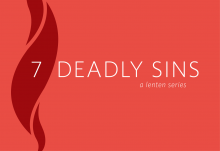
I live in Washington D.C., a city in which mistakes are messaged and shortcomings are spun. True confession and true repentance do not occur — unless it is politically advantageous. Naturally, cynicism runs rampant.
In this environment, though we all know our own weaknesses, grace is rarely offered for failures.
Which is why Lent is such an important season on the Christian calendar. It is an opportunity to pause and reflect, to examine our hearts, and to acknowledge the ways in which we have fallen short. But we don’t confess our failures to a public waiting to crucify us. Instead, we confess our sins to one who loves us and was willing to be crucified in order to reconcile us once and for all.
Lent is rarely talked about as a celebration, but it is an opportunity to revel in the joy of forgiveness.

Small.
If my name had a synonym, that'd be it. At least if we're going by the most-commonly-used word to describe me by both friends and strangers, Asians and non-Asians.
At five-one-and-three-quarters and just a little over 100 pounds, I will be the first to agree: I am small. No matter how much I eat or how little I exercise, I have still been able to get away with jeans and form-fitting dresses from high school. It's great — but the problem is, it makes it all the easier to hide my struggles with food.
A few weeks ago, some of my fellow interns and I decided to celebrate "Fries"-day (Friday) with an Amazon Local deal for Z-Burger. $22 worth of food for just $11. It was an intern's dream come true. It was also two days after Ash Wednesday.
After finishing my last fry, I texted a friend about how greasy my insides felt but how good the splurge was. He shared what he'd had for lunch, and despite my bursting stomach, I responded with "Ooh that sounds so yummy." That's when I realized I had a problem.
Wrath
Rolling in the Deep — Adele
Mama Said Knock You Out — LL Cool J
Sloth
Lazy Song — Bruno Mars
Je Ne Veux Pas Travailler — Pink Martini
Greed
Rich Girl — Gwen Stefani ft Eve
I Want It All — Queen
Gluttony
Eat It — Weird Al Yankovich
Can’t Stop — Miley Cyrus
Lust
I Want You to Want Me — Letters to Cleo/10 Things I Hate About You soundtrack
I’m Sexy and I Know It — LMFAO
Pride
I’m the Best (clean version) — Nicki Minaj
Devil Went Down To Georgia — Charlie Daniels Band
Envy
Jessie’s Girl — Rick Springfield
Dancing on My Own — Robyn

Let those who boast, boast in this, that they understand and know me, that I am the Lord; I act with steadfast love, justice, and righteousness in the earth, for in these things I delight, says the Lord.” (Jeremiah 9:24, NRSV)
Pride has taken many forms in my life, but most dangerously in this: I have taken myself far too seriously. You wouldn’t think that a neurotic worrier who spent eight years in therapy would be full of pride. But for years I was utterly consumed with anxiety over what would happen in my life, because I believed that it should go a certain way and that I had both the responsibility and ability to bring that about.
So there’s nothing like having your worst fear come true — 19 months* of unemployment in a bad economy — to show you how small you really are, especially compared to God.
It was kind of amazing.



Last week during my Sunday school class, one of my second graders asked, “How can we go to heaven, if we continue to sin?”
As usual, I am often stunned and quieted by the striking questions that come from the mouths of young people.
I usually respond to the inquisitive questions from my Sunday School students by reiterating what I have been told by many a Sunday School teacher: “Even though we break our promises, God doesn’t; God promised us if we believe in God and that God’s Son Jesus died for our Sins, we will go to heaven — even when we mess up.”
While that seems like a really ‘simple’ explanation of one of many biblical truths, it is still striking and amazing that even though we continue to ‘mess up,’ God has not retracted on God’s promise of offering us a beautiful ending to the troubled world we live in today.
As I think about Romans 8:21 and how it speaks to the fact that “creation itself will be liberated from its bondage to decay and brought into the freedom and glory of the children of God,” I get excited. Not only because we all will see the glory of God one day, but that the bondage and decay we are experiencing in our physical world will end in Glory!

So here we go again. It’s that time of year — Lent, when many Christians give something up. Often it’s food, although my mom told me when I was a kid that giving up vegetables doesn’t count.
A few years ago, as we approached Lent, a few of my friends (who during the rest of the year rejected religion), announced they, too, were giving something up. What, exactly, they were relinquishing, I don’t remember — and it doesn’t matter.
At the time, it was a joke — “Don’t want to upset Baby Jesus …”
While I still chuckle at the memory, it has lost some of the humor. As the Facebook statuses appeared in my newsfeed leading up to Lent, with my friends announcing what people are giving up or crowd-sourcing ideas, I found myself getting frustrated.